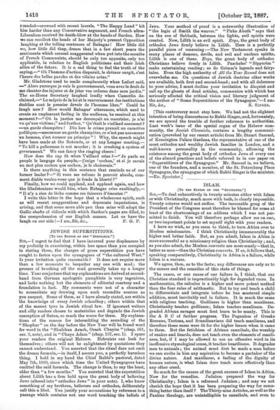JEWISH SUPERSTITIONS.
[To THE Rerron or rex "Gramme:)
Srs,—I regret to find that I have incurred your displeasure by my prolixity in examining, within less space than you occupied in stating them, the charges of gross superstition you have sought to fasten upon the synagogues of "the cultured West." Is your irritation quite reasonable ? It does not require more than a few moments to bespatter any one with mud; the process of brushing off the mud generally takes up a longer time. Your conjecture that my explanations are derived at second- hand from German apologetic pamphlets is very ingenious, and lacks nothing but the elements of editorial courtesy and a foundation in fact. My comments were not of a character to necessitate my drawing upon such recondite sources as you suspect. Some of them, as I have already stated,-are within the knowledge of every Jewish schoolboy ; others within that of the merest tyro in Jewish ritual law. If ignorant writers and silly readers choose to materialise and degrade the Jewish conception of Satan, so much the worse for them. My explana- tions of the reason for intermitting the sounding of the " Shophar " on the day before the New Year will be found word for word in the " Shulchan Aruch, Orach Chayim " (chap. 581, sec. 3, note), and in " Chaye Adam" (chap. 137, sec. 1). I spare your readers the original Hebrew. Hebraista can look for themselves ; others will not be enlightened by quotations they cannot understand. You asserted that the ritual dare not omit the dream formula,—in itself, I assure you, a perfectly harmless thing. I hold in my hand the Chief Rabbi's pastoral, dated May 7th, 1880, since which time the United Synagogues have omitted the said formula. The change is thus, to say the least, older than"a few months." You asserted that the superstition about Lilith has a firm hold upon the great body of believing Jews (altered into " orthodox Jews " in your note). I, who know something of my brethren, believers and orthodox, deliberately call this a libel. You justify your accusations by reference to a passage which contains not one word touching the beliefs of
Jews. Your method of proof is a noteworthy illustration of " the logic of Smith the weaver." " Pirko Aboth " says that on the eve of Sabbath, between the lights, evil spirits were created. Now, Lilith is an evil spirit. Ergo, the great body of orthodox Jews firmly believe in Lilith. Here is a perfectly parallel piece of reasoning,—The New Testament speaks in many places of demons, devils, and evil and unclean spirits. Lilith is one of these. Ergo, the great body of orthodox Christians believe firmly in Lilith. Pascheles' " Sippnrim " make entertaining reading ; so do Grimm's legends and fairy. tales. Even the high authority of All the Year Bound does not overwhelm me. On questions of Jewish doctrine other works are available, both first and second-hand ; and with all deference to your advice, I must decline your invitation to disquiet and call up the ghosts of dead articles, communion with which has seriously affected the critical vision and literary judgment of the author of " Some Superstitions of the Synagogue."—I am, [This controversy must stop here. We had not the slightest intention of being discourteous to Rabbi Singer, and, fortunately, we are spared the trouble of further reference to authorities. Last week's issue of the special organ of the Hebrew com- munity, the Jewish Chronicle, contains a lengthy communi- cation (provoked by our recent article) from Mr. Stuart Samuel, of Kensington Palace Gardens, the representative of one of the most orthodox and wealthy Jewish families in London, and a well-known personality in the community, affirming the existence among the great body of orthodox Jews of every one of the absurd practices and beliefs referred to in our paper on " Superstitions of the Synagogue." Mr. Samuel is, we believe, one of the founders, and a member, of the St. Petersburg Place Synagogue, the synagogue of which Rabbi Singer is the minister. —En. Spectator.]






































 Previous page
Previous page